Small business owners face the difficult challenge of balancing daily tasks and meeting client expectations. As you strive to grow your business, you’ll find it harder to scale by doing everything on your own.
Thankfully, service management software exists to help you organize tasks and automate key processes. In this article, we’ll review the best service management software for small business owners looking to optimize their workflows.
Top 5 Service Management Software for Small Business Owners
Operating a small business calls for top-notch tools to manage field service operations. The right software keeps you organized, boosts team coordination, and leaves customers satisfied.
Here are our top picks for the best field service software for small businesses:
1. Job-Dox
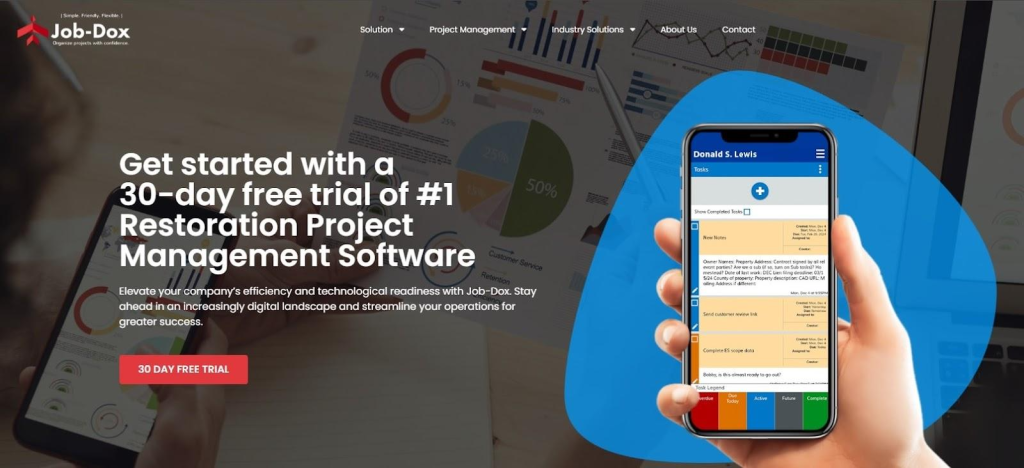
Job-Dox delivers a streamlined approach to field service management for small businesses. It offers real-time tracking that keeps projects on course and your team aligned.
The platform’s mobile app provides immediate access to job details and client information, so technicians can stay in the field without returning to the office. This reduces downtime and boosts efficiency on-site. Updated information from the field keeps your team operating seamlessly.
Client communication becomes more straightforward with Job-Dox, as you can send automated updates and offer clients a portal to monitor project progress or reschedule services as needed.
Job-Dox supports efficient resource management, keeps data organized, and maintains smooth operations for your business.
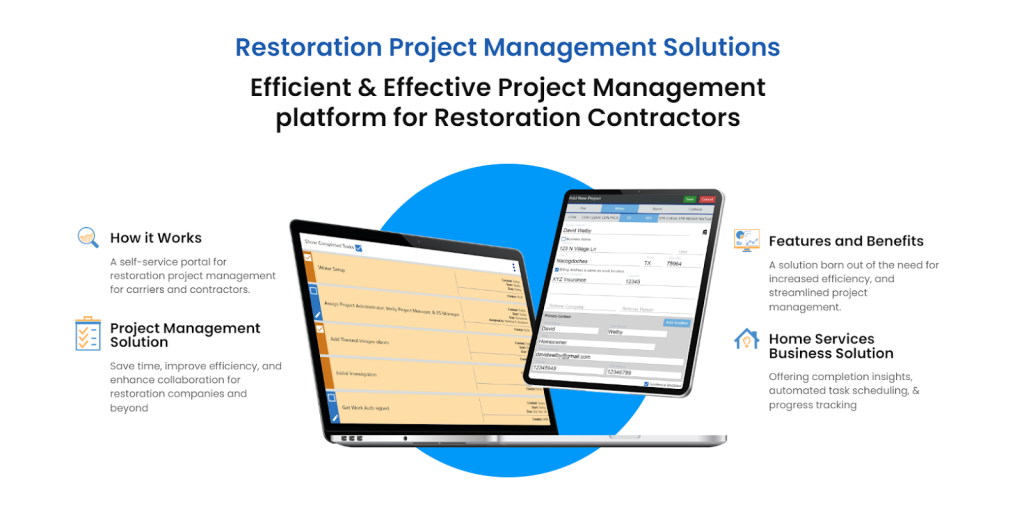
Key Features
- Stay updated with real-time project tracking: Know the status of every project instantly. Job-Dox keeps your team on the same page so everyone stays in sync without missing a beat.
- Centralized document organization: Stop wasting time searching for work orders, agreements, or other paperwork. Job-Dox brings all critical documents together for easy access.
- Mobile connectivity for on-site technicians: Empower your technicians to stay connected on the go. They can update job statuses and communicate with the office directly, no matter where they are.
- Automated client updates for clear communication: Keep clients informed and at ease with automated project updates through a dedicated client portal, saving everyone time.
- Intuitive task scheduling: Easily assign tasks and set deadlines with a simple interface so your team knows what needs to be done to keep projects on track.
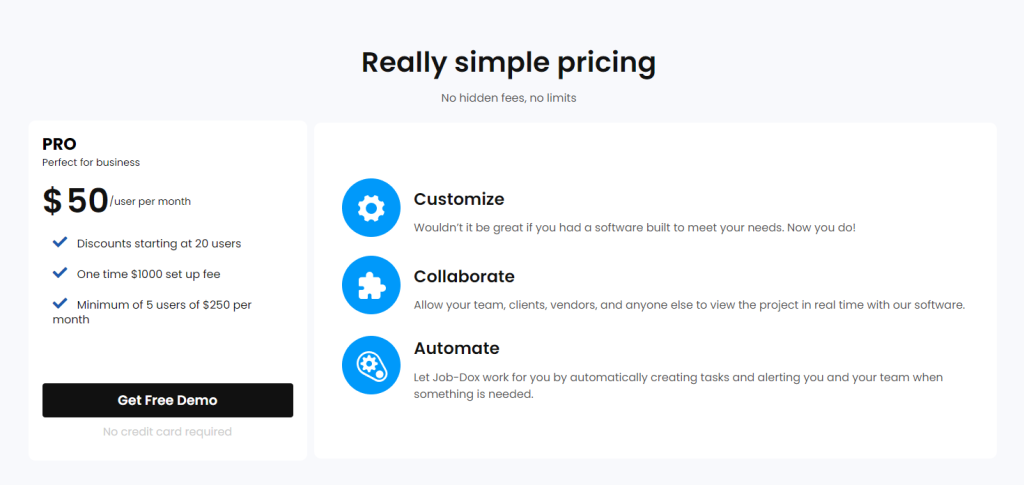
Pricing
Job-Dox’s ideal pricing for small field service businesses makes it easy to have advanced service management software without breaking the bank. It only costs $50 per user monthly with a one-time setup fee of $1,000.
2. ServiceTitan
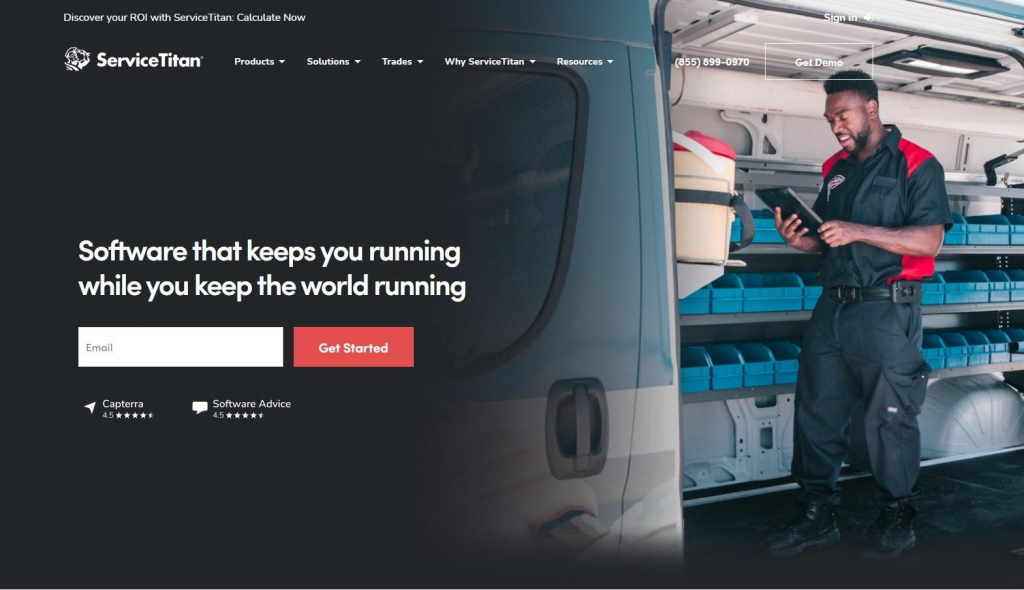
Source: ServiceTitan
ServiceTitan is field technician software that lets small field service businesses run efficiently and expand without needing a large staff. A compact team can manage multiple tasks effectively, delivering prompt service to clients.
With ServiceTitan’s mobile tools, your team can access job details, create estimates, process payments, and review job history on the go—all from their mobile devices.
ServiceTitan also integrates with QuickBooks, keeping financial records in order. For client growth, the platform’s marketing features and customer management tools help. Its CRM supports targeted marketing campaigns, allowing a more personal experience for each client.
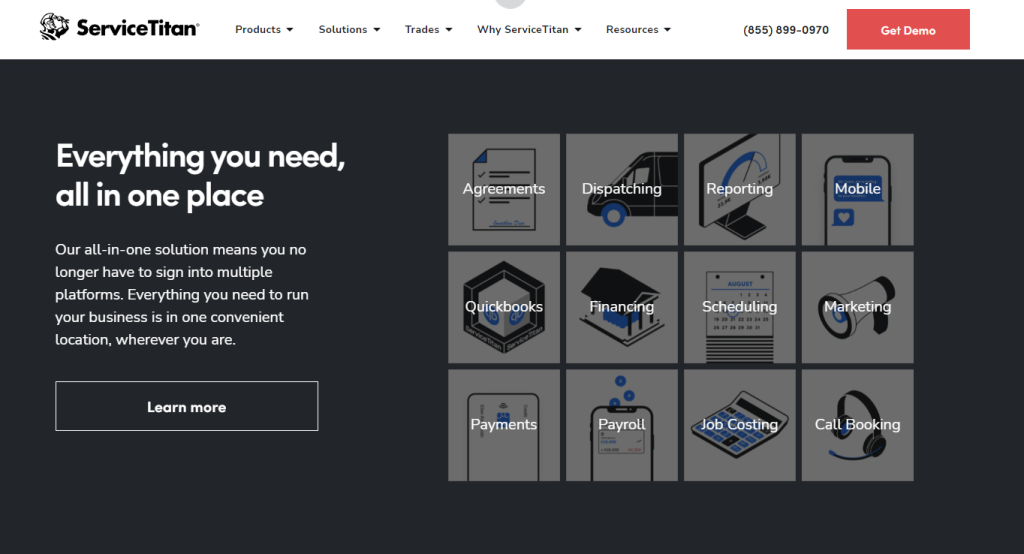
Source: ServiceTitan.com
Key Features
- Automate scheduling and dispatch: ServiceTitan’s drag-and-drop calendar assigns technicians according to skills, location, and availability. Complete more jobs quickly while updating customers promptly.
- Dedicated mobile field app: Access job details, send estimates, and process payments on the go with ServiceTitan’s mobile app to keep your team connected with the office in real time.
- Pricebook management: Customize your service prices using ServiceTitan’s Pricebook management tool. This tool syncs seamlessly with your invoicing system for accurate billing and better transparency for customers.
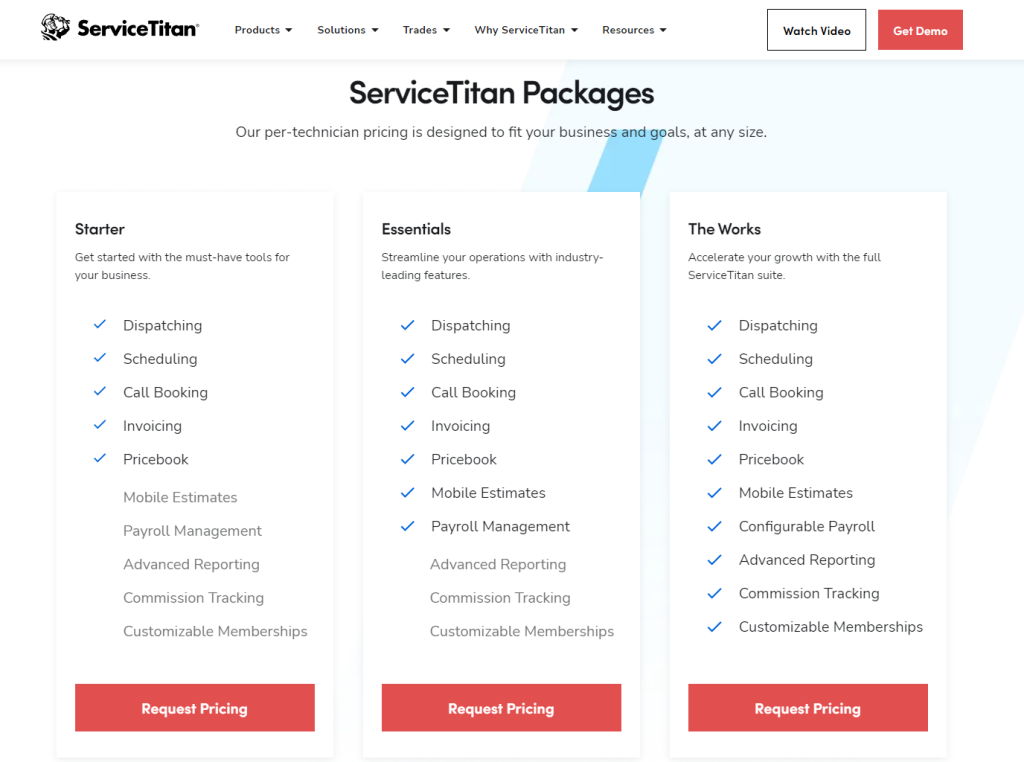
Source: ServiceTitan.com
Pricing
ServiceTitan doesn’t have fixed pricing plans. Instead, they offer custom packages for small field service businesses. You’ll have to contact them directly and request the price of each package.
3. Service Fusion
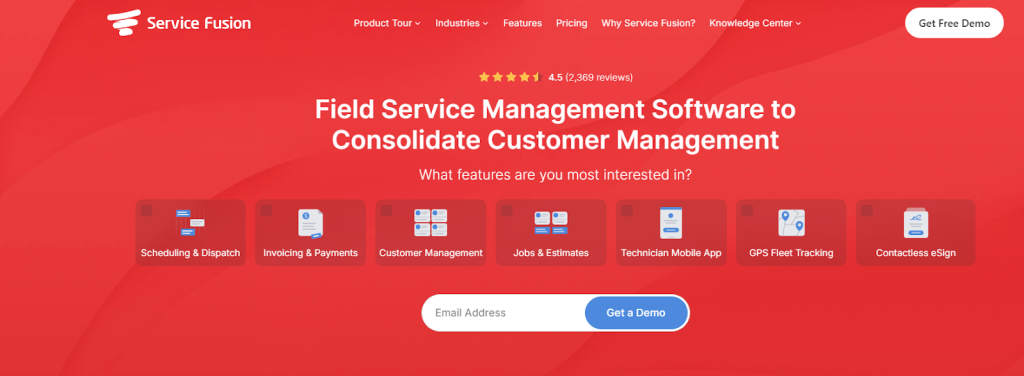
Source: Service Fusion
Service Fusion helps small businesses manage scheduling, invoicing, and customer communication in one place. Its user-friendly interface lets teams handle administrative tasks to focus on more fieldwork and customer service. The mobile app connects office staff and field workers for faster updates and fewer missed appointments.
Its reporting tools give business owners clear insights into job status and revenue. Integration with QuickBooks lets you sync financial data without relying on manual entry.
With GPS tracking and automated reminders, Service Fusion keeps field operations accurate and on time.
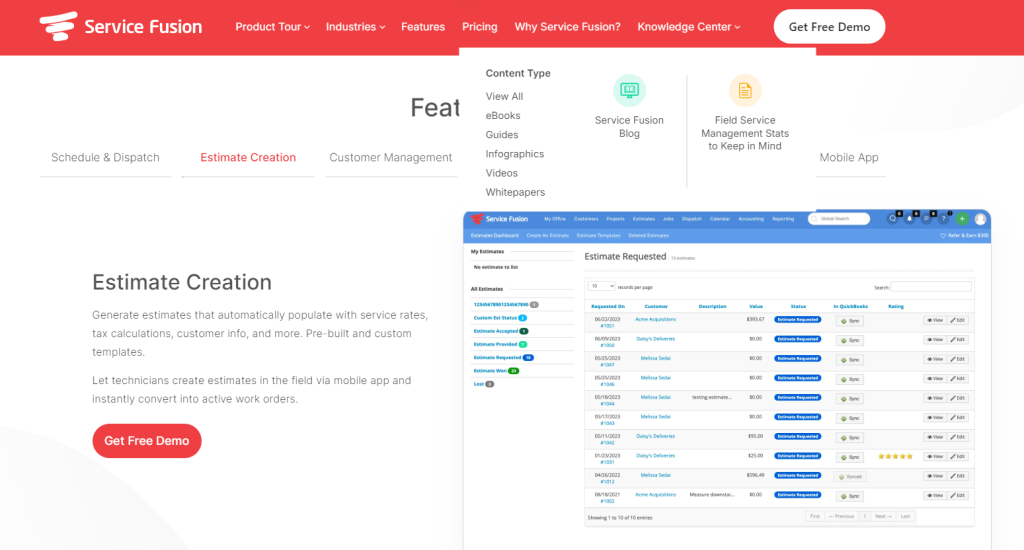
Source: Service Fusion
Key Features
- Job scheduling and dispatching in one system: Service Fusion provides a unified platform where businesses can assign tasks, track job progress, and manage technician availability all in one place.
- FusionPay for payment processing: Service Fusion enables businesses to handle payments directly on the platform through FusionPay, which accepts cash, checks, and credit cards.
- QuickBooks integration for seamless accounting: The QuickBooks integration helps businesses sync invoices, payments, and other financial data. This feature streamlines accounting tasks and supports financial accuracy, which gives small businesses more time to focus on growth.
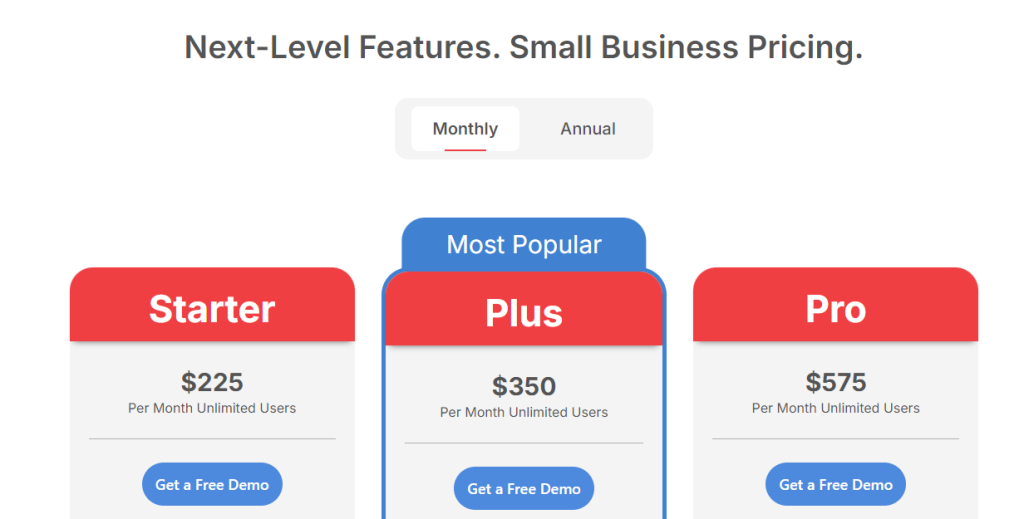
Source: Service Fusion
Pricing
- Starter plan ($225 per month): This plan includes essential features like customer management, job scheduling, QuickBooks integration, and invoicing. It suits smaller businesses looking for basic tools to manage daily operations, and it allows unlimited users.
- Plus plan ($350 per month): In addition to everything in the Starter plan, the Plus plan includes integrated voice and text capabilities, enhanced communication tools, and access to job photo uploads, inventory management, and job costing. It’s ideal for businesses that want stronger collaboration features.
- Pro plan ($575 per month): The Pro plan includes all features from the Plus plan, along with open API integration, progressive billing, and a customer web portal. This option is geared toward businesses with more complex billing needs or requiring advanced software integrations.
4. Albiware
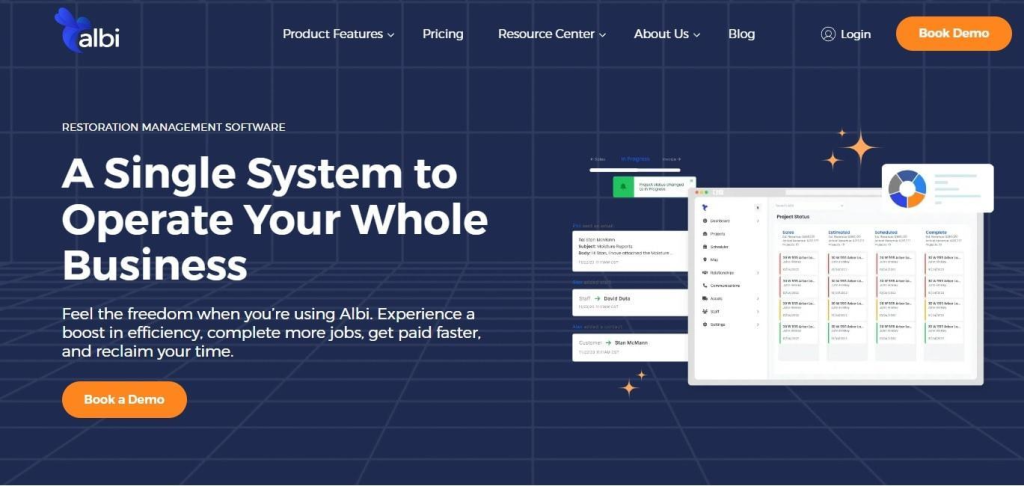
Source: Albiware
Albiware is field service management software tailored for small companies in the restoration and construction industry.
The app combines multiple features, such as job management and equipment tracking, into a single platform. Field service technicians can use Albiware’s mobile app to note job details and communicate with the office anytime, anywhere.
Albi DryBook 2.0 is perfect for taking moisture readings and photos, two features that are helpful for technicians in the plumbing field.
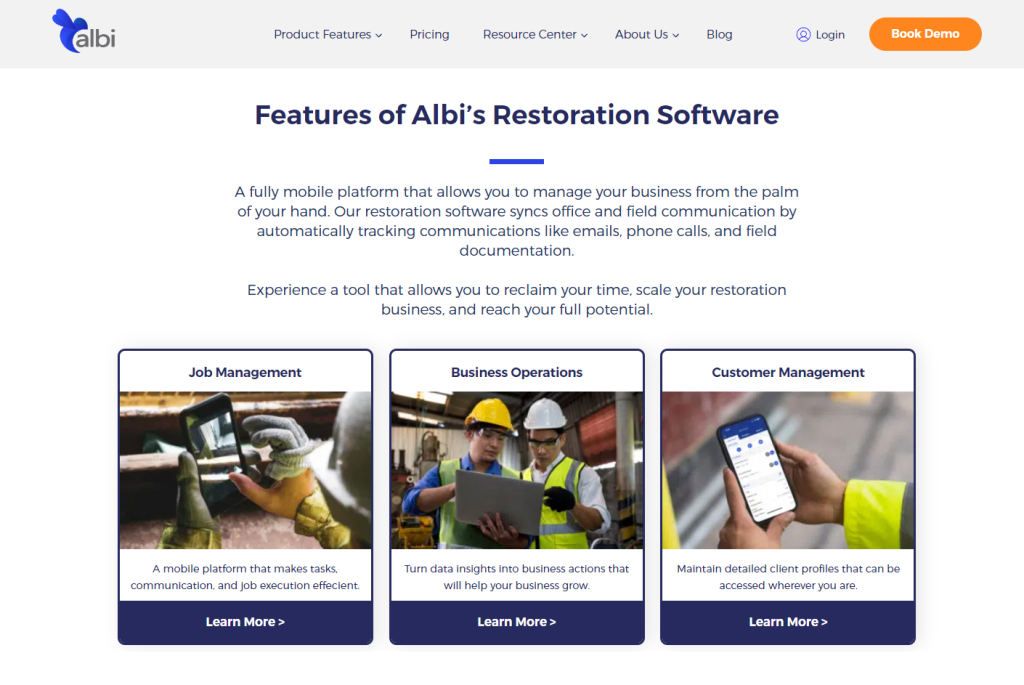
Source: Albiware
Key Features
- DryBook 2.0 integration: Document restoration jobs directly within the management system, creating detailed dry plans, tracking equipment, and generating reports seamlessly. The system automates reporting and integrates photos, floor plans, moisture data, and more.
- All-in-one platform: Albiware combines tools for marketing, sales, field documentation, and job tracking, removing the need for multiple platforms to manage your restoration business.
- Customizable workflows: Albiware’s system offers flexibility, letting field service companies adapt workflows and processes to meet specific needs.
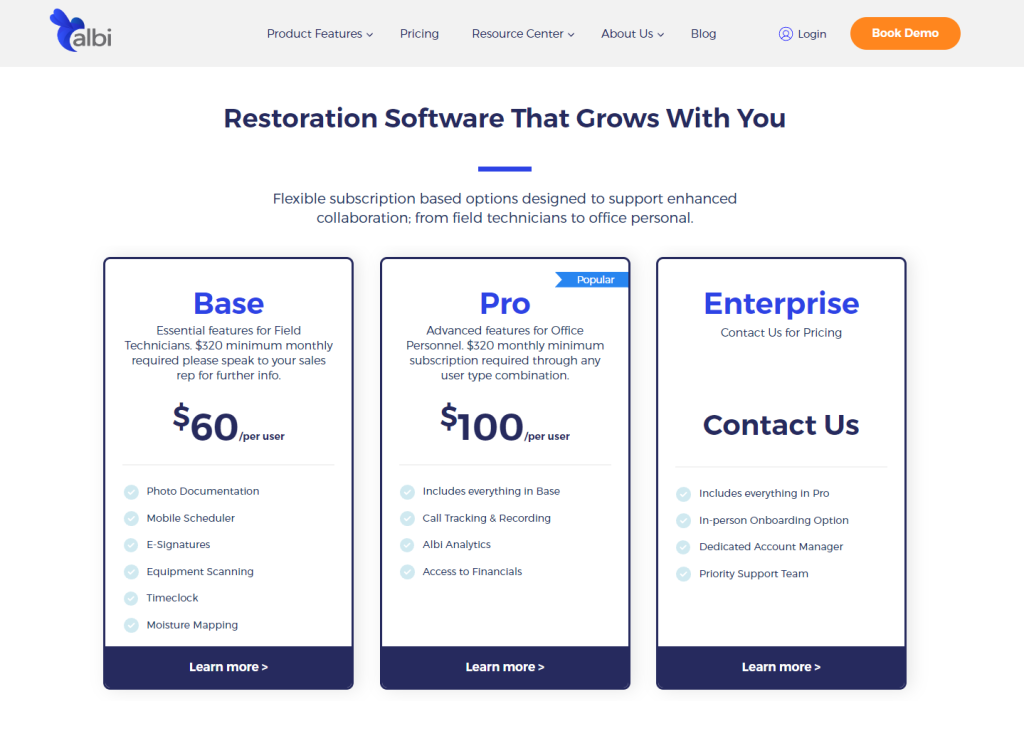
Source: Albiware
Pricing
- Base plan ($60/user/month): Ideal for field technicians; this plan includes photo documentation, mobile scheduling, e-signatures, equipment scanning, time clock tracking, and moisture mapping.
- Pro plan ($100/user/month): Designed for office staff; this plan includes all Base plan features plus call tracking, Albi Analytics, and access to financial data.
- Enterprise plan (custom pricing): Tailored for teams with 20+ users; this plan provides all Pro plan features, in-person onboarding, a dedicated account manager, and priority support.
It’s important to note that the Base and Pro plans have a monthly minimum of $320.
5. Housecall Pro
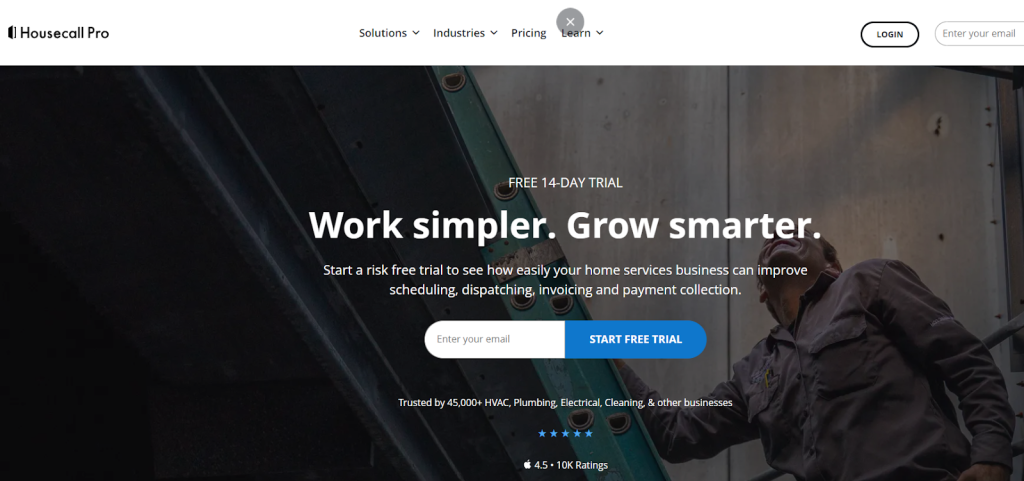
Source: Housecall Pro
Housecall Pro gives small businesses an all-in-one platform for managing day-to-day tasks. In a few steps, business owners can quickly schedule jobs, send invoices, and communicate with clients.
The platform’s straightforward design means teams learn it fast, so productivity starts immediately. Integrating with tools like QuickBooks makes Housecall Pro simplify financial tracking and cuts down on mistakes.
Automated reminders and live updates keep customers informed, leading to better satisfaction and loyalty. Housecall Pro helps small businesses provide a professional experience to make operations smoother and customer relationships stronger.
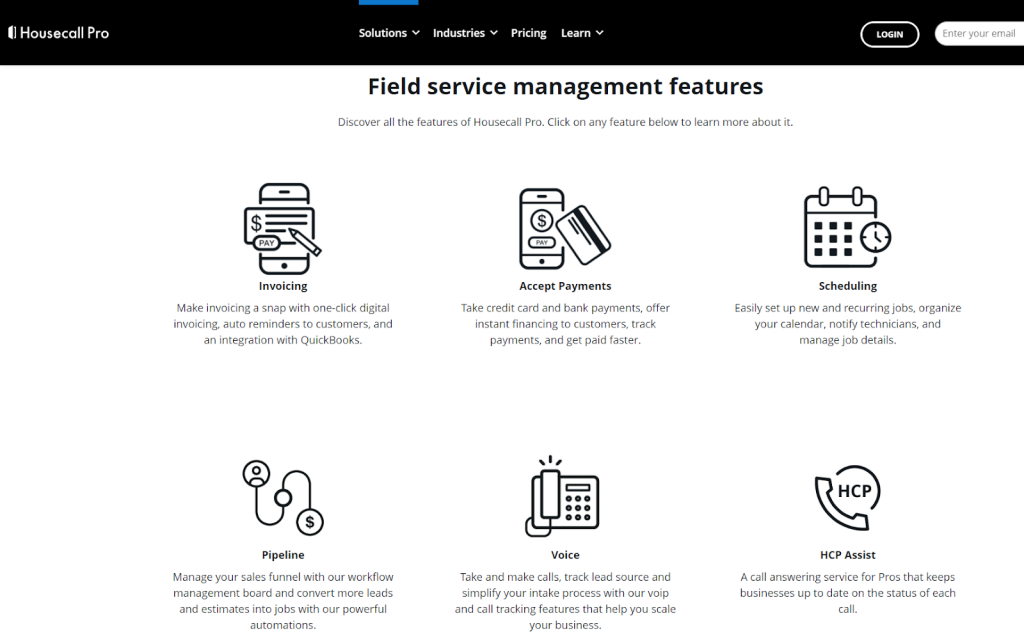
Source: Housecall Pro
Key Features
- Pipeline management: Housecall Pro’s pipeline allows users to control the entire sales funnel, moving leads through estimates, job assignments, and invoicing all in one place. This feature empowers businesses to convert more leads, fueling growth and strengthening client satisfaction.
- Job costing insights: Housecall Pro tracks expenses, materials, and labor to reveal profitability on every job. This feature equips businesses with a clear financial view, helping them make data-driven decisions and maintain steady profitability.
- Integrated VoIP (voice over IP): Housecall Pro’s built-in VoIP system streamlines customer calls and tracks communications directly in the app, giving businesses a seamless way to organize customer contacts and follow-ups without additional software.
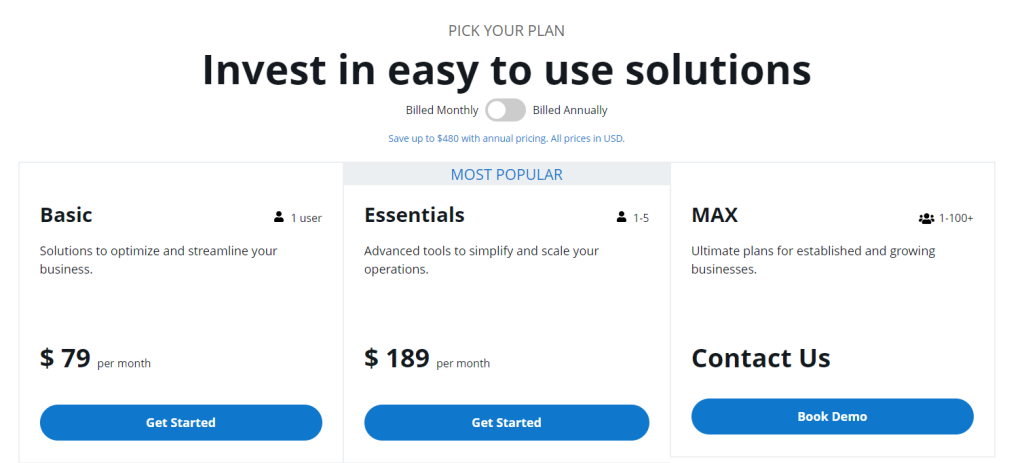
Source: Housecall Pro
Pricing
- Basic plan: $79 per month for a single user, covering core features like scheduling, invoicing, estimates, and customer notifications.
- Essentials plan: $189 per month, supporting up to five users, with added functionalities such as online booking, employee time tracking, and QuickBooks integration.
- Max plan: Custom pricing (requires a sales consultation), designed for businesses with larger teams needing advanced reporting, GPS tracking, and data integration capabilities for up to 100 users.
Why Do Small Businesses Need Service Management Software?
Small businesses succeed when they keep operations smooth and customers happy, and service management software helps make that happen. The right tools allow businesses to track customer requests, schedule tasks, and monitor job progress.
Here are a couple of reasons why service management software is a game-changer for small businesses:
Organize Daily Operations Efficiently
Service management software organizes daily tasks for small businesses and allows them to handle everything in one place. Owners can assign tasks and track job progress without needing separate software.
Field service management tools give teams a clear view of responsibilities, which keeps everyone organized. With clearly defined workflows, field service teams can avoid simple errors and focus more on the task at hand.
Improve Customer Experience and Meet Customer Expectations
Customers today expect prompt responses and personalized service, and service management software helps small businesses meet those standards. Teams can access customer details within the software to provide customized support and handle requests promptly.
Customer management tools store client history, job site information, and preferences so teams can tailor their approach for each customer.
Streamline Scheduling and Dispatching for Field Service Operations
Scheduling and dispatching are vital to field service operations, and service management software helps businesses manage those tasks. Businesses automate scheduling to avoid double-booking and assign employees based on real-time availability.
With field service software’s GPS and route-planning features, employees spend less time traveling and more time serving customers. Organized field service scheduling reduces fuel costs and maximizes productivity to help small businesses manage their resources more effectively.
Track and Monitor Business Performance
Tracking business performance may seem complex for small operations, but service management software makes it straightforward. The software captures key performance indicators (KPIs) like productivity, job completion rates, and customer satisfaction.
These KPIs help business owners make informed decisions and address any gaps in their field service operations.
Manage Inventory More Effectively
Service management software often includes inventory management tools, which help businesses monitor materials and equipment needed at job sites.
Owners can view current inventory levels and make quick adjustments to meet demand and reduce delays caused by missing parts. Inventory management software also alerts businesses when supplies run low, allowing prompt reordering.
Compete With Larger Businesses Using Field Service Management Tools
Field service management tools allow small businesses to compete effectively with larger companies. These tools provide capabilities like customer relationship management (CRM) integration, invoicing platforms, and inventory management in one system.
With automated communication and organized scheduling, small businesses deliver seamless service that often rivals larger companies.
Features to Look for in Service Management Software
When choosing service management software for small businesses, seek features that drive growth and simplify daily operations. Here are the top tools to focus on, in detail, to help you make a smart decision for improving workflow and customer satisfaction.
Scheduling and Dispatch Capabilities
Scheduling and dispatch tools create a foundation for efficient operations, helping service companies manage appointments and assignments with minimal downtime.
Real-Time Scheduling
Real-time scheduling allows quick appointment adjustments, reducing risks of overbooking and missed opportunities. A service business that can respond rapidly to customer requests builds loyalty and dependability.
Automated Reminders
Automated reminders help avoid no-shows with timely alerts to customers and staff, keeping everyone on the same page for upcoming appointments. Fewer missed engagements save resources and keep operations running smoothly.
GPS Tracking for Dispatch
For service businesses with mobile teams, GPS tracking provides live location updates, allowing dispatchers to assign tasks based on proximity. This results in efficient route planning and faster response times, improving the overall quality of service delivery.
Inventory and Asset Management
Inventory and asset management tools maintain organized stock control, ensuring service businesses always have needed resources on hand.
Real-Time Inventory Tracking
Real-time inventory tracking shows current stock levels and helps avoid shortages or overstocking. For a field service management solution, having precise inventory data readily available boosts preparedness and productivity.
Automatic Reordering
Automatic reordering sends alerts when supplies hit a preset threshold, simplifying the restocking process. Service companies stay ready with this tool, knowing they have resources available to meet demand.
Asset Lifecycle Management
Asset lifecycle management monitors equipment condition and usage, reducing unexpected downtime from repairs. Tracking asset health allows service businesses to operate without disruption, saving maintenance costs over time.
Customer Relationship Management
A well-designed CRM organizes customer data in one place, allowing service businesses to create a better customer experience at every step.
Contact and History Tracking
Contact and history tracking compiles customer information and past interactions, giving employees insights that lead to personalized service. Customers feel valued when the business remembers important details and makes interactions smoother and more relevant.
Customer Feedback Collection
A CRM that gathers customer feedback uncovers areas needing improvement and highlights what clients appreciate. Service companies benefit from feedback, as direct insights help them focus on improvements that matter to customers.
Service Request Management
Service request management helps businesses track and prioritize customer inquiries in real time, supporting a fast response to each need. Handling multiple requests efficiently leaves customers satisfied and strengthens loyalty.
Reporting and Analytics
Reporting and analytics tools provide insights that guide better decisions and help improve a small business’s operational efficiency.
Performance Tracking
Performance tracking records employee productivity and job completion rates, helping managers spot areas for improvement. Data-backed insights like these keep service companies focused on efficiency and high-quality results.
Financial Reporting
Financial reporting offers clear views of revenue, expenses, and profits, helping business owners understand their financial health. Knowing where the money goes allows service businesses to control costs and recognize new opportunities.
Trend Analysis
Trend analysis identifies patterns in demand and service performance, revealing opportunities for growth. Service companies can adjust resources and staffing during peak periods with this data, staying one step ahead of customer needs.
Mobile Access and Compatibility
Mobile access allows employees to work from anywhere, ensuring service delivery remains seamless when staff are on the move.
Mobile App Availability
A mobile app lets employees access schedules, customer data, and inventory information in the field. Field service management benefits from mobile access, as teams stay connected without returning to the office.
Offline Access
Offline access keeps employees working smoothly, even in areas with poor connectivity. Having the option to operate offline prevents disruptions, especially for those working in remote locations.
Cross-Device Compatibility
Cross-device compatibility lets employees switch between tablets, phones, or computers without losing data. A consistent experience across devices boosts team coordination and helps everyone work more efficiently.
Invoicing and Payment Processing
Invoicing and payment processing features make transactions easy for customers while speeding up cash flow for businesses.
Automated Invoicing
Automated invoicing creates and sends invoices without human intervention, avoiding manual errors. With this feature in place, service companies save time and enjoy timely billing.
Online Payment Options
Online payment options give customers a fast way to pay, improving convenience and revenue collection speed. Customers appreciate a streamlined payment process, and businesses see faster payments.
Payment Tracking
Payment tracking monitors outstanding invoices and received payments, making follow-ups easy. For small businesses, staying on top of payments improves financial stability and maintains a healthy cash flow.
Key Considerations for Adopting Service Management Software for Small Businesses
Choosing the right service management software is more than just picking the latest or most popular option. Small businesses need software that aligns with their specific needs and budgets.
Here are a few key considerations to help you make an informed decision.
Define Your Business Needs
Identifying specific goals for field service management software helps small businesses select tools that genuinely fit their operations. Different software options offer varied features, including scheduling, invoicing, and customer management.
Start by pinpointing core areas for improvement, such as cutting down on paperwork, optimizing technician schedules, or enhancing customer satisfaction. Clear objectives guide software selection, aligning the solution with the business’s unique requirements.
Focus on Scalability
Selecting software with room to grow helps small businesses avoid costly transitions in the future. Field service needs evolve as companies expand, often requiring more advanced capabilities, such as analytics, customer relationship management, or mobile app integrations.
Choosing scalable field service management solutions supports growth without forcing a switch. Many platforms offer tiered pricing, allowing businesses to start with basic features and add more as they grow.
Look for User-Friendly Features
Easy-to-navigate software aids staff adoption, minimizing disruptions and supporting smoother operations. Look for a platform with an intuitive interface, clear organization, and accessible support resources.
A simple, well-organized tool helps employees embrace new technology, especially for those less familiar with digital tools. Testing a trial version allows teams to experience usability firsthand, helping them make a well-informed decision.
Check Integration Capabilities
Small businesses often use existing systems for accounting, CRM, and inventory management, which need to integrate smoothly with field service management solutions. Effective integration allows a seamless data flow, reducing manual entry and potential errors.
Look for software that connects with widely used tools or offers an open API if the business relies on custom applications.
Verify Mobile Functionality
Field service companies often have technicians working remotely, making mobile functionality essential in field service management software. Remote staff need access to schedules, real-time job updates, and easy communication channels.
Look for apps that include GPS navigation, offline access, and photo capture. Mobile access keeps field staff updated and aligned with office operations, reducing delays and improving responsiveness.
Analyze Pricing and Costs
The cost of field service management solutions varies widely based on features, user numbers, and additional services. Small businesses should evaluate the total cost, covering licensing, support, and possible add-ons.
Subscription-based pricing often suits smaller budgets, while contract terms should be reviewed closely to avoid unexpected fees or penalties if a cancellation becomes necessary.
Prioritize Data Security
Field service companies manage sensitive customer information, making data security a top priority. Confirm that the field service management provider adheres to strong security practices, such as encryption, regular backups, and user authentication.
Data breaches carry serious risks, so choosing a vendor with a reliable security track record builds customer trust and prevents potential legal issues.
Evaluate Customer Support
Strong customer support significantly impacts the transition to new field service management software. Look for providers offering multiple support channels, including phone, email, and live chat.
Vendors that provide training and onboarding resources deliver more value, especially during initial setup. Some providers assign account managers to answer questions promptly, making it easier to resolve issues and ensure a smooth start.
Efficient Project Management With Job-Dox
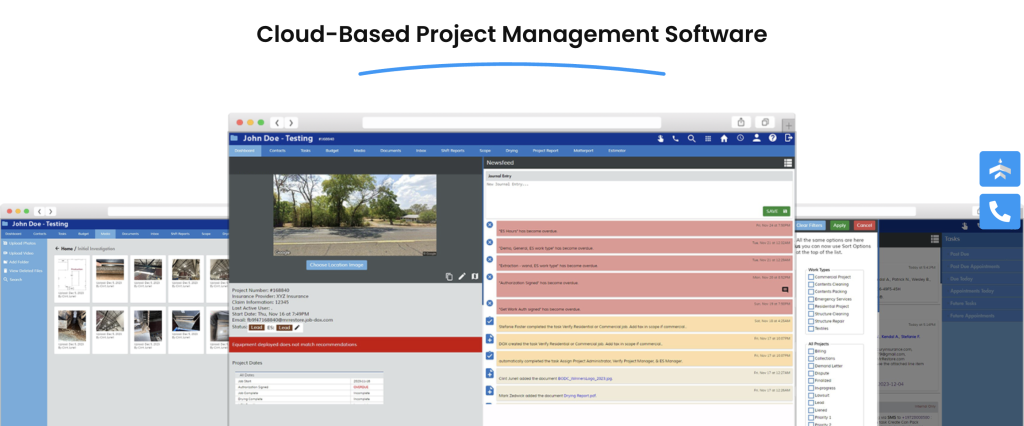
Job-Dox is the #1 field service management software for restoration tasks. It offers a centralized platform for job and schedule management, employee management, team collaboration, customization, equipment tracking, and more.
This software helps you improve efficiency, save time, and automate repetitive tasks–all from one platform.
To get started with Job-Dox, call them at 888-983-9834 or drop a message at info@job-dox.com.
You can also sign up and enjoy a 28-day free trial!
FAQs About Service Management Software for Small Business
How does service management software handle customer service requests?
The software organizes customer requests, assigns tasks to team members, and keeps customers updated on their requests.
What tasks can small businesses track with service management software?
Service management software allows small businesses to track jobs, appointments, work orders, and maintenance tasks. It can also store notes and customer details in one place to keep everything organized.
Does service management software improve scheduling for small businesses?
Yes. Most options include job scheduling tools for better employee dispatching.
Can service management software handle invoicing and payments?
Many service management tools offer invoicing features that let small businesses create invoices, send reminders, and accept payments within the system.
Is service management software customizable for different types of small businesses?
Yes. Job-Dox lets businesses customize fields, forms, and workflows to fit their unique needs.





